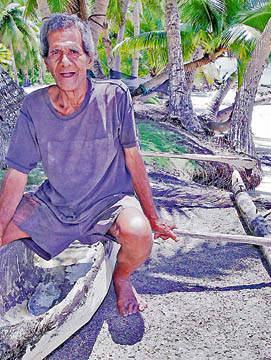From Fijitimes
Online (13 December 2020)
Susau Nonu
Home is where the fish are
By Theresa Fox
 |
| Susau Nonu listens to the tide that tells him when to go out fi shing. He hears the fi sh that whisper to him through their habits, where to find them. Picture: Theresa Fox |
TRUE as a homing beacon, Susau Nonu always came back home to Rotuma.
His eyes twinkled as he glanced over the blue hues of the ocean muttering, “It’s the fishing that brings me back”.
“I’ve been to Suva four times but came back.”
Using a fishing line he fastened the parts of his vaka together ready for the evening’s uru or redfish fishing expedition.
When the tide goes out, he jumps aboard his vaka and heads out to all those familiar ‘uru haunts. The night’s high tide brings him back to the shores of Kalvaka in Noatau district with a basket full of ‘uru. With the rising sun, he heads out to roadside markets nearby to sell his fish.
It’s a routine as perfected with time as it is intimate with nature.
Rotuma is beautiful like that. Like the way Nonu sees it. A place bursting with richness from the sea and land, as if nature is eager to bless the people.
“I go out and fish in the moonlight for uru,” he said.
Nonu listens to the tide that tells him when to go out fishing. He hears the fish, that whisper to him through their habits, where to find them. The moonlight directs his path through the ocean to the fishing spots. The high tide reminds him of its time to stop fishing and return home. Other days, he works in his garden. It’s simple, island living and indigenous spirituality that still exists on Rotuma. A spirituality and ecological connection that is the heritage of many Pacific islanders. But it’s a connection weakened by many forces including modern development, rural-urban drifts, changed lifestyles and general non-practice.
The Reweaving the Ecological Mat movement initiated by the Institute for Mission and Research (IMR) promotes the rekindling of connections like Nonu’s for the fullness of life in the Pacific Islands.
A Leadership and Management Training coordinated by IMR with the Methodist Church of Rotuma discussed these elements of change that have impacted Rotuma.
One is the increasing reliance on remittance income from families abroad to buy processed food and less use of farmland to eke a living. The training heard Rotuman traditional leaders must encourage initiatives on the island that ensures Rotuman’s remain connected to their ecology.
With fewer farmers farming or people fishing, the transfer of knowledge from father to son also declines.
Nonu loves fishing just as his father did.
“Woo, the fish is beautiful, very nice, nice fish,”
Nonu shares excited.
“When I finished school in the 1960s that’s the time I started going out fishing with my father.
“But when I was younger my father didn’t allow me to go out with him because of the weather which is sometimes bad.
“I always insisted with him that I wanted to go out and learn all his skills because one time I will take over from him.”
He talks about the visits to Fiji. How he found life tough to deal with.
“In Fiji, everything little and big, you got the money, you get it.
“You got no money, some people will see you in the rubbish dump.
“Here you got no money, wow, you can eat everything you want.
“But I tell you what’s there in the shop, chicken and corned beef is not good for your life,’ he said pointing to his heart.
“Eat fish, vegetables and baigani (eggplant).”
Yet together with his pride, he shows concern for Rotuma.
“Things have changed. Before we got everything easy from the plantation and sea but now it is hard..
He surmised that it was due to people’s changing behaviours in disrespecting the divine.
“Because they don’t know God and don’t respect God’s blessings of the land and sea.
“Now we see rubbish thrown into the sea.
“And some don’t respect the land.
“There’s a Rotuman saying that the land has eyes and teeth.
“If we do wrong things, if the land doesn’t get you out here it will get you out there,’ he said pointing out to sea.
And with that remarkable statement, he carried on strengthening his vaka. Eager for the evening’s tide and the ‘uru bounties that awaited him.
• Theresa Fox is the communications officer for the Institute of Mission and Research at the Pacific Theological College.





